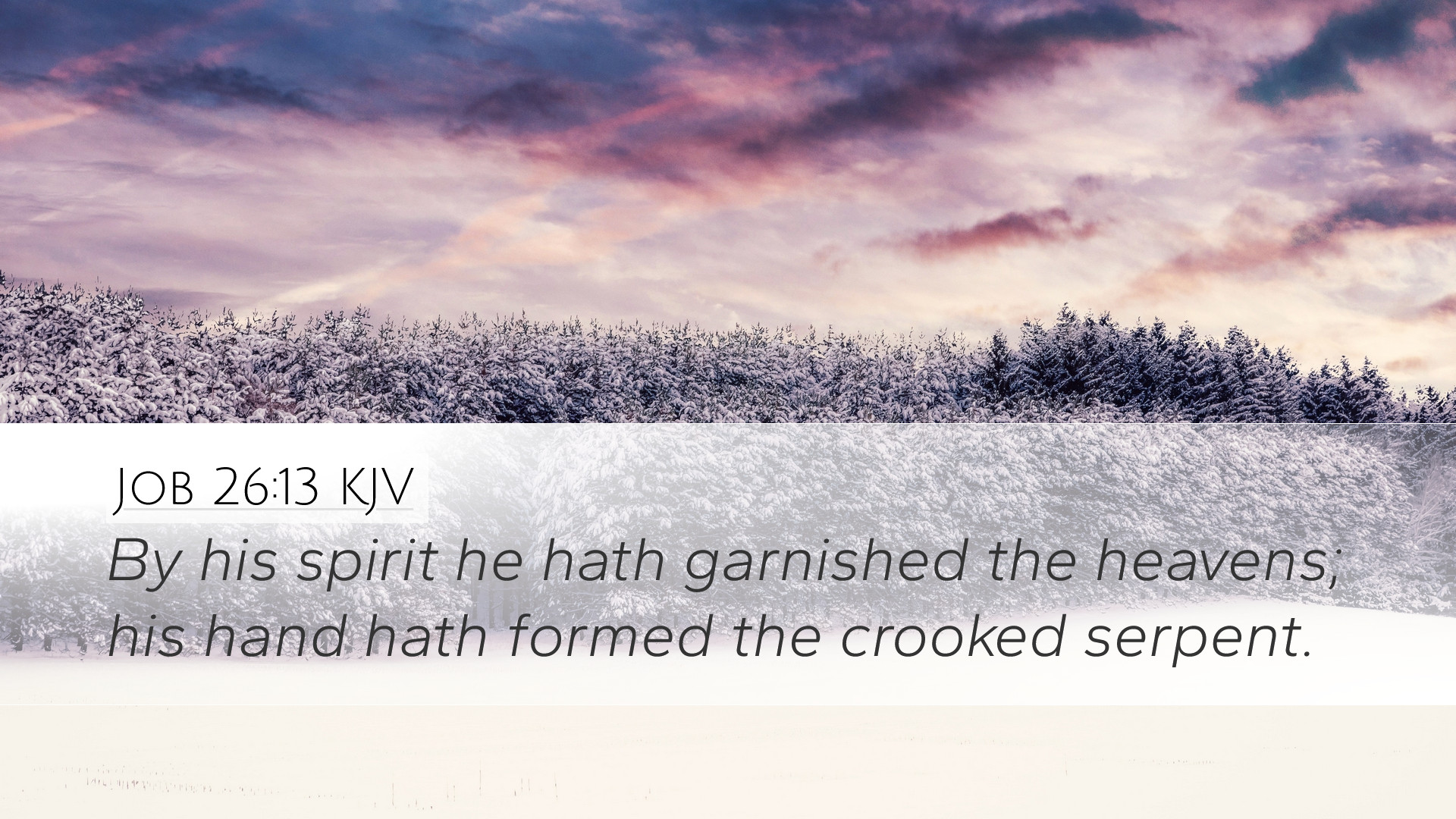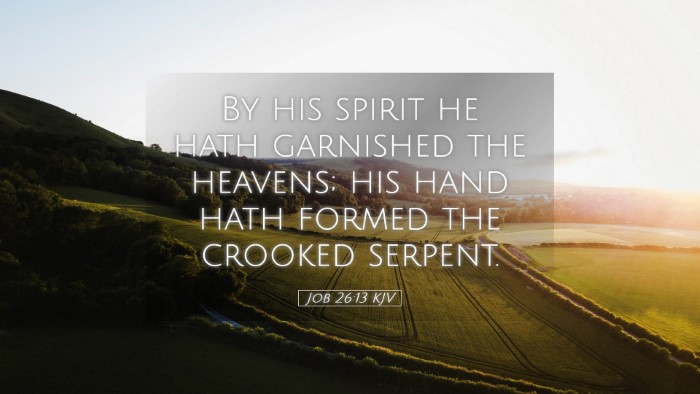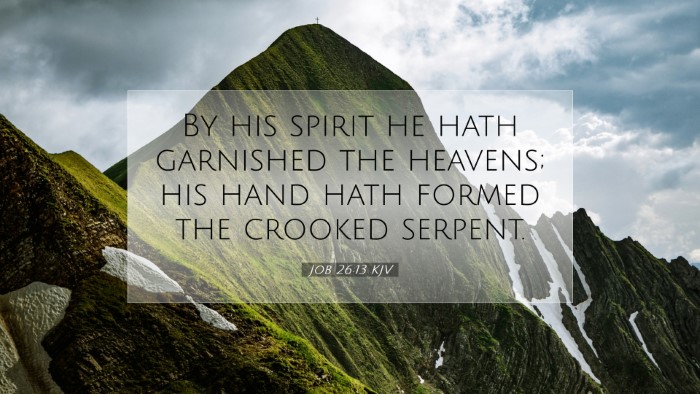Old Testament
Genesis Exodus Leviticus Numbers Deuteronomy Joshua Judges Ruth 1 Samuel 2 Samuel 1 Kings 2 Kings 1 Chronicles 2 Chronicles Ezra Nehemiah Esther Job Psalms Proverbs Ecclesiastes Song of Solomon Isaiah Jeremiah Lamentations Ezekiel Daniel Hosea Joel Amos Obadiah Jonah Micah Nahum Habakkuk Zephaniah Haggai Zechariah MalachiJob 26:13
Job 26:13 KJV
By his spirit he hath garnished the heavens; his hand hath formed the crooked serpent.
Job 26:13 Bible Commentary
Commentary on Job 26:13
Job 26:13 states: "By His spirit He hath garnished the heavens; His hand hath formed the crooked serpent." This verse encapsulates profound theological insights into both the nature of God and His relationship with creation, providing rich material for pastors, students, theologians, and Bible scholars.
Understanding the Verse
The verse can be understood in two distinct yet interconnected parts:
- The Role of God's Spirit in Creation
- Symbolism of the Crooked Serpent
The Role of God's Spirit in Creation
Job’s declaration about God’s Spirit emphasizes the divine intelligence and artistry behind the creation of the heavens. According to Matthew Henry, this indicates that God is the ultimate source of beauty and order in the universe.
Henry highlights that the word "garnished" implies a careful and intentional design, pointing to the majesty of God’s creative work. The heavens, filled with stars and celestial wonders, are the showcase of God's power and creativity.
Albert Barnes adds to this by explaining that the use of God’s Spirit suggests an active and ongoing role of the divine in sustaining creation. The Spirit of God is not simply Creator, but also the Sustainer, who breathes life and order into the cosmos.
Significance of God's Hand
Job asserts that it is God's hand that forms and shapes creation. Adam Clarke emphasizes the anthropomorphic language used here, ascribing human-like qualities to God to help understand divine actions. God's "hand" symbolizes His power and sovereignty over all that exists.
This imagery expresses that every aspect of creation, including the vastness of the universe, bears the imprint of God's meticulous and sovereign will.
The Symbolism of the Crooked Serpent
The phrase "crooked serpent" has intrigued scholars and theologians alike. In this context, it can symbolize various aspects of life and creation.
- The Crooked Serpent as a Representation of Chaos
- The Crooked Serpent as a Divine Creation
The Crooked Serpent as a Representation of Chaos
Some commentators note that the "crooked serpent" may be understood as a symbol of disorder or chaos. Matthew Henry suggests that this might represent the adversarial forces in creation, which, while seemingly counter to God’s intended order, are nevertheless under His ultimate control.
This interpretation provides a comforting thought for believers as it implies that even what appears chaotic is still fashioned and permitted by God, ultimately leading to the fulfillment of His divine purposes.
The Crooked Serpent as a Divine Creation
On the other hand, Adam Clarke posits that the "crooked serpent," often associated with creation, serves to illustrate the complexity and variety of God’s creative designs. It can signify that everything, even what we may view as negative or 'crooked,' is within God’s hand and part of His creation. Thus, this serpent metaphor can inspire awe at the multifaceted nature of God's works.
Clarke notes that the inclusion of a creature often construed as dangerous or undesirable reflects God’s comprehensive sovereignty, reminding us that the divine intention stretches beyond human understanding.
Theological Implications
This verse leads us towards several theological reflections:
- The Sovereignty of God
- The Nature of Creation
- The Complexities of Life
The Sovereignty of God
Job 26:13 clearly affirms God’s ultimate authority over the universe. Albert Barnes assures that everything proclaims the greatness of God’s creative majesty. The unseen threads of creation reveal a God who not only sets things in motion but also governs their course.
The Nature of Creation
The phrase "garnished the heavens" invites believers to contemplate the beauty and intentionality behind creation. Clarke reflects on how this beauty can lead to worship and admiration for the Creator. It contrasts the temporary and flawed aspects of human existence with the eternal and flawless designs of God.
The Complexities of Life
The metaphor of the crooked serpent invites contemplation on the complexities and adversities of life. Just as God created both order and chaos, Christians are called to explore how these elements coexist in their own journeys. As Matthew Henry describes, believers are encouraged to walk in faith, knowing that all things are under God’s providential care.
Practical Applications for Believers
Based on the insights from Job 26:13, several practical applications emerge for the Christian life:
- Awe and Worship: Recognizing the grandeur of creation should lead to deeper worship and reverence for God.
- Faith in Sovereignty: Trusting in God’s sovereignty over the chaotic aspects of life provides comfort and resilience in trials.
- Embracing Complexity: Understanding that God intricately designs both joy and suffering encourages a holistic view of life.
Conclusion
Job 26:13 is a profound verse that speaks to the majesty of God as the Creator and Sustainer of the universe. Through the enriched insights of commentators like Matthew Henry, Albert Barnes, and Adam Clarke, we find a deeper understanding of God’s nature and His relationship with creation.
This verse provides encouragement to believers to maintain faith amidst life's complexities, celebrating the beauty and order found within the divine framework of existence.


